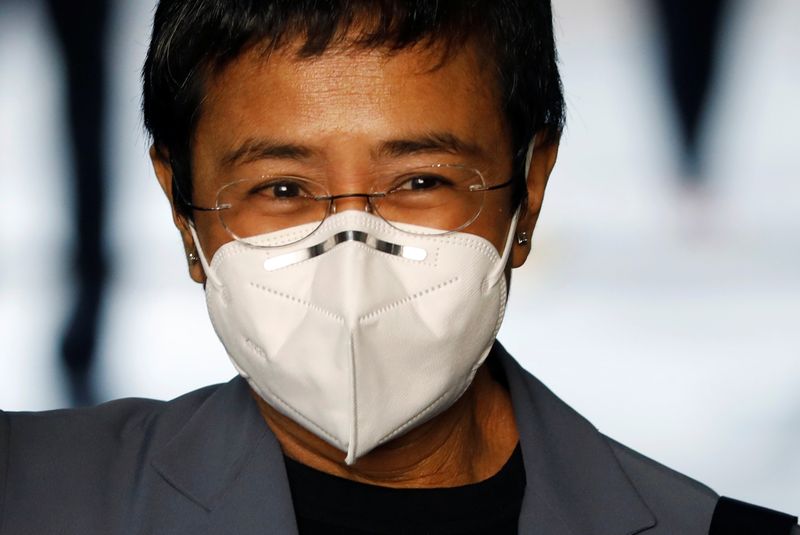By Karen Lema
MANILA (Reuters) - Veteran Philippine journalist Maria Ressa, whose website has put President Rodrigo Duterte under tough scrutiny, was convicted of libel on Monday and faces up to six years in jail, in a ruling widely seen as a blow to media freedom.
Ressa, chief executive of Rappler (www.rappler.com) and a former CNN journalist, was charged with "cyber libel" over a 2012 article that linked a businessman to illegal activities.
After the verdict, Ressa vowed not be silenced and accused the judiciary of becoming complicit in a campaign to stifle press freedom in the Southeast Asian nation.
"We're at the precipice, if we fall over we're no longer a democracy," she told reporters.
The decision fuelled concern over human rights in a country where Duterte's war on drugs has left thousands dead and he recently renewed a threat to kill drug dealers, despite condemnation in a U.N. report.
He is soon expected to sign an anti-terrorism law his opponents fear could target them, but which he says is needed to fight extremism.
To the shock of many, leading broadcaster ABS-CBN Corp, which had criticised Duterte, had to stop broadcasts last month after its licence expired.
In handing down the verdict against Ressa, 56, a dual U.S.-Filipino citizen, Judge Rainelda Estacio-Montesa said the exercise of a freedom "should and must be used with due regard to the freedom of others".
Ressa faced up to six years in jail, the judge said.
Reynaldo Santos, a former Rappler researcher and writer, was also found guilty. Both were granted bail pending an appeal.
Presidential spokesman Harry Roque said Duterte supported freedom of speech and it was a previous administration that pushed for the "cyber libel" law. Duterte had never filed a libel case against a journalist, he added.
PRESS FREEDOM INDEX
Human rights lawyer Amal Clooney, part of a legal team representing Ressa, called the conviction "an affront to the rule of law, a stark warning to the press, and a blow to democracy in the Philippines".
"I hope that the appeals court will set the record straight in this case. And that the United States will take action to protect their citizen and the values of their Constitution," she said in a statement.
U.S. lawmakers have previously criticised what they see as harassment.
The cyber libel case is one of numerous lawsuits the government has filed against Ressa and Rappler that have spurred global concern about the intimidation of reporters.
Media watchdogs and human rights groups condemned Monday's verdict, which Amnesty International called a "sham" that "should be quashed".
"With this latest assault on independent media, the human rights record of the Philippines continues its free fall," Nicholas Bequelin, its Asia-Pacific regional director, said in a statement.
The Philippines slipped two places in the World Press Freedom Index this year to 136 among 180 countries, down from 134.
Businessman Wilfredo Keng featured in a 2012 Rappler story, updated in 2014, linking him to illegal activities, citing information in an intelligence report from an unspecified agency.
In his complaint, Keng said the story included "malicious imputations of crimes, vices and defects."
The court ruling said Rappler showed "actual malice" for not publishing at least a clarification after Keng complained.
Media watchdogs have said numerous charges against Ressa, including alleged foreign ownership violations and alleged tax evasion, aimed to intimidate critics of Duterte.

Rappler has questioned the accuracy of Duterte's public statements and scrutinised his war on drugs and foreign policies. Duterte has lashed out at the news site in public speeches.